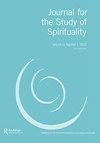Conventional and unconventional forms of religiosity: identifying predictive factors and wellbeing outcomes
IF 0.8
0 RELIGION
引用次数: 1
Abstract
This study examines sociodemographic and wellbeing factors associated with forms of religiosity involving conventional religious belief (CRB) and daily spiritual experience (DSE), and unconventional paranormal beliefs in lifeforms (UPBL) and paranormal beliefs excluding extraordinary lifeforms (UPBEEL). Self-reported data collected from Australian Facebook users (N=760; Female: 57%) suggest that CRB was significantly higher in Christian participants and lower in those who identify as non-religious and spiritual. However, levels of unconventional religiosity involving UPBL and UPBEEL were significantly higher among Pagans and those who identify as spiritual but not religious, but lower among non-religious participants. Compared to Christian participants, being spiritual and pagan were negatively associated with the level of security. After controlling for relevant sociodemographic characteristics, conventional forms of religiosity involving DSE were positively related to life satisfaction, life security, and trust level. UPBL was also positively associated with wellbeing outcomes but UPBEEL was inversely related to all wellbeing outcomes. Further analysis reveals that religious status moderates the links between conventional and unconventional forms of religiosity, such that paranormal beliefs tended to be higher when CRB and DSE each had a unique interaction with religious status. These results show that forms of religiosity are related to wellbeing differently and suggest the influence of cognitive biases related to religious/spiritual teachings and experiences in enacting the quest for deeper spiritual, paranormal experiences. Study limitations are discussed.传统和非传统形式的宗教信仰:确定预测因素和幸福结果
本研究考察了与涉及传统宗教信仰(CRB)和日常精神体验(DSE)的宗教信仰形式、非传统生命形式的超自然信仰(UPBL)和不包括特殊生命形式的超常信仰(UPBEEL)相关的社会人口统计和幸福因素。从澳大利亚脸书用户(N=760;女性:57%)收集的自我报告数据表明,基督徒参与者的CRB显著较高,而非宗教和精神信仰者的CRB较低。然而,涉及UPBL和UPBEEL的非传统宗教信仰水平在异教徒和那些认为自己是精神但不信教的人中显著较高,但在非宗教参与者中较低。与基督教参与者相比,精神和异教徒与安全水平呈负相关。在控制了相关的社会人口学特征后,涉及DSE的传统形式的宗教信仰与生活满意度、生活安全感和信任水平呈正相关。UPBL也与幸福感结果呈正相关,但UPBEEL与所有幸福感结果呈负相关。进一步的分析表明,宗教地位调节了传统和非传统形式的宗教信仰之间的联系,因此当CRB和DSE与宗教地位都有独特的互动时,超自然信仰往往更高。这些结果表明,各种形式的宗教信仰与幸福感的关系不同,并表明与宗教/精神教义和体验相关的认知偏见对寻求更深层次的精神、超自然体验的影响。讨论了研究的局限性。
本文章由计算机程序翻译,如有差异,请以英文原文为准。
求助全文
约1分钟内获得全文
求助全文
来源期刊

Journal for the Study of Spirituality
RELIGION-
CiteScore
2.50
自引率
7.10%
发文量
25
期刊介绍:
Journal for the Study of Spirituality is a peer-reviewed journal which creates a unique interdisciplinary, inter-professional and cross-cultural forum where researchers, scholars and others engaged in the study and practices of spirituality can share and debate the research, knowledge, wisdom and insight associated with spirituality and contemporary spirituality studies. The British Association for the Study of Spirituality (BASS) organises a biennial international conference and welcomes enquiries about membership from those interested in the study of spirituality in the UK and worldwide. The journal is concerned with what spirituality means, and how it is expressed, in individuals’ lives and communities and in professional practice settings; and with the impact and implications of spirituality in, and on, social policy, organizational practices and personal and professional development. The journal recognises that spirituality and spiritual values can be expressed and studied in secular contexts, including in scientific and professional practice settings, as well as within faith and wisdom traditions. Thus, Journal for the Study of Spirituality particularly welcomes contributions that: identify new agendas for research into spirituality within and across subject disciplines and professions; explore different epistemological and methodological approaches to the study of spirituality; introduce comparative perspectives and insights drawn from different cultures and/or professional practice settings; aim to apply and develop sustained reflection, investigation and critique in relation to spirituality and spiritual practices; critically examine the values and presuppositions underpinning different forms of spirituality and spiritual practices; incorporate different forms of writing and expressions of spirituality.
 求助内容:
求助内容: 应助结果提醒方式:
应助结果提醒方式:


